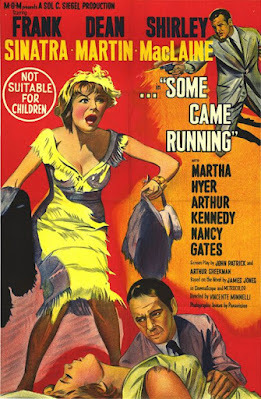Some Came Running, Some Stayed Away

In 1951, World War II veteranJames Jones published a blockbuster novel about the lives and loves of Americantroops stationed in Honolulu at the time of the attack on Pearl Harbor. When FromHere to Eternity became a film two years later, it took Hollywood by storm.Its 13 Oscar nominations resulted in eight wins, including Best Picture, BestDirector, and a statuette for Frank Sinatra, bringing his own bitterness andpugnacious spirit to the role of Maggio, as the year’s Best Supporting Actor.
It seemed the combination ofJames Jones’ writing and Sinatra’s acting chops was a potent one. That’s why,when in 1957 Jones published a second novel—this time dealing with a returningsoldier during the post-war period—Hollywood again came calling, ready to starSinatra as a tough-but-tender protagonist in another James Jones adaptation. But Jones’ new novel, Some Came Running,had a few problems. The New Yorker’s critic colorfully called it “twelvehundred and sixty-six pages of flawlessly sustained tedium.”
This was the shoot on whichSinatra, always an impatient actor, apparently ripped twenty pages out of thescript in order to keep the film’s length close to the two-hour mark. DirectorVincente Minnelli, looking for a change of pace from his own sparkling Gigi(also from 1958), had the challenge of corralling Sinatra and co-star DeanMartin, while also staying true to his own artistic vision. It culminated in abrilliantly florid climax, set at night amid the gaudy neon lights of asmall-town carnival. The film earned five Oscar noms, mostly in actingcategories, but not a single win. (Gigi and the actors from SeparateTables were the year’s big awards recipients.)
I’ve heard film scholarspraise the aesthetics of Some Came Running, as well as Minnelli’s blunttreatment of the hypocrisies of Midwest life. And I can’t deny that there aresome strong performances, notably that of Shirley MacLaine (nominated for herfirst Oscar for this, her all-time favorite role). She plays Ginny, a slightlytawdry but good-hearted waif whose love for Dave leads at last to tragedy. (Thefilm’s tweak of the novel’s original ending definitely increases itspoignance.) There’s also good work by Sinatra and by his pal, Dean Martin, as ahard-drinking gambler who’s lovable but on a path to self-destruction.
All this should make it clearthat the film’s plot is an intensely melodramatic one, with far too manycharacters and lots of lurid small-town misbehavior. When Sinatra’s character,in military uniform, gets off the bus in his old hometown, it’s clear he’s abit disgusted by the locals, but even more unimpressed with himself. Thoughhe’s published several novels and has something of a literary reputation (like,of course, James Jones), he seems unable to move forward with his writingcareer. He’s also got a serious grudge against the well-heeled brother (ArthurKennedy) who’s now one of the town’s leading citizens but chafes at his wife’ssnootiness, to the point where he strays with an attractive employee.
Oddly, it’s through hisbrother that Sinatra’s Dave comes to know a local professor and hisschoolmarm-daughter, both of whom highly respect him as a man of letters. We’resupposed to believe that the prim schoolteacher (Martha Hyer) is Dave’s truelove, though—aside from a rare moment when he literally takes her hair down—sheseems incapable of passion of any sort. Her scenes with Sinatra come across as stodgy, as she lectures him onliterature and life. Under the circumstances, a gauche, umgrammatical Ginnywould seem like an improvement, especially given MacLaine’s wistful charm.
Beverly in Movieland
- Beverly Gray's profile
- 10 followers



